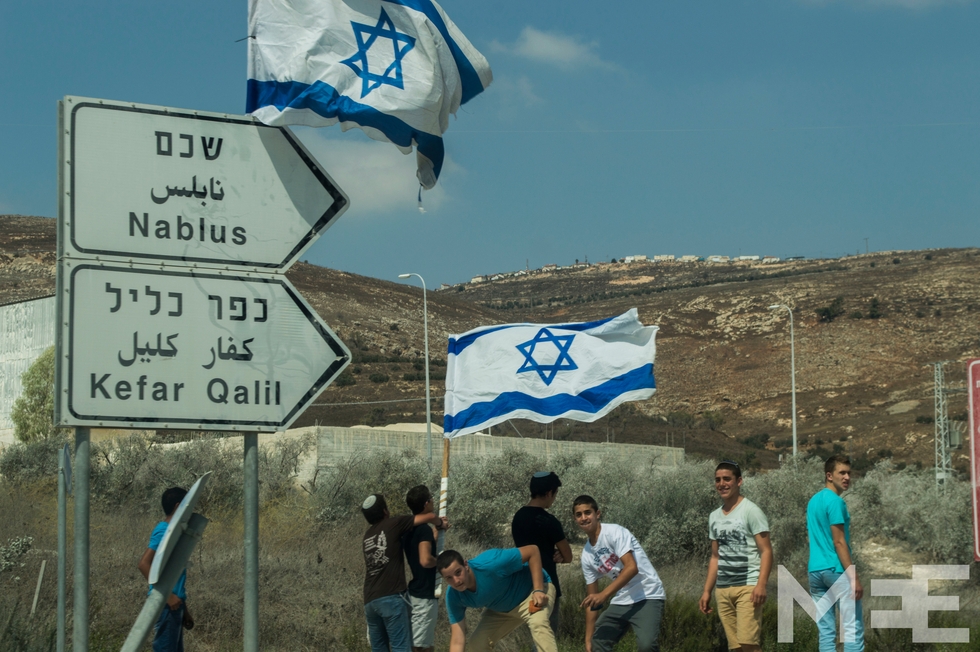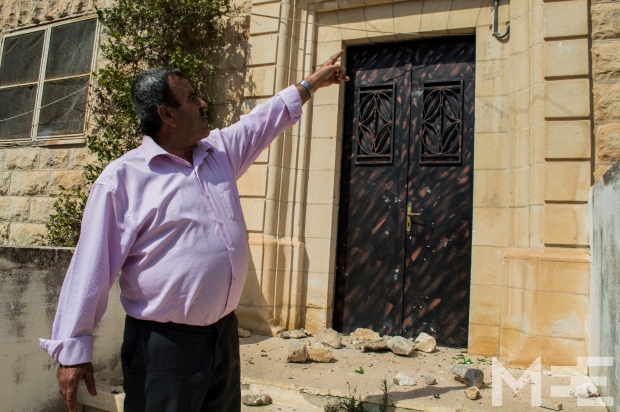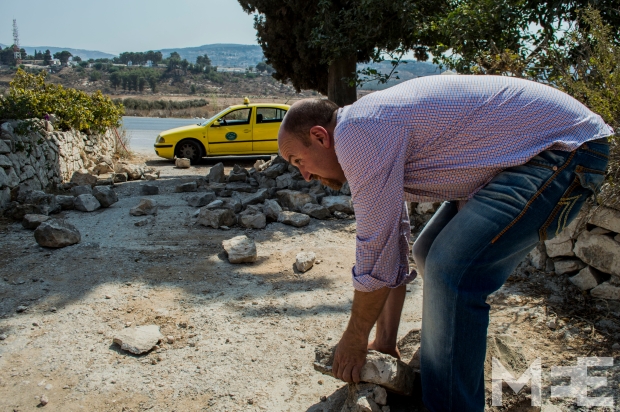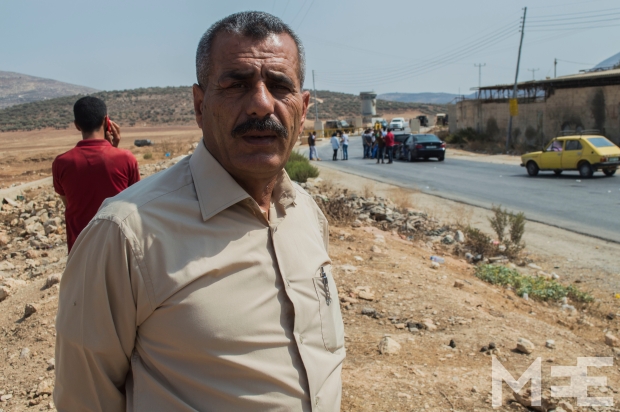Palestinians attacked following West Bank murder of 2 Israeli settlers

NABLUS, Occupied Palestinian Territories - Tensions between Israeli settlers and Palestinians in the occupied West Bank reached a breaking point on Friday evening, following the murder of an Israeli settler couple in the northern West Bank district of Nablus.
The two settlers were killed in a drive-by shooting by suspected Palestinians, though no group has taken responsibility for the attack.
As news of the killings spread, clashes erupted, with reports of hundreds of Israeli settlers taking to the streets throughout the West Bank - particularly in Nablus - throwing rocks at Palestinian cars and attacking Palestinian villages.
Marwan Mustafa, 61, told Middle East Eye that his home on the outskirts of Burin Village in the Nablus district is often attacked by settlers from one of the many surrounding Israeli settlements near his home.
The attacks on Thursday night were some of the worst he has ever experienced, he said.
The driveway leading to Mustafa’s house is littered with heavy stones from a wall originally laid by his grandfather more than 60 years ago, half of which, he said, was dismantled by the attacking settlers.
Broken stones and glass bottles that were thrown at the home’s doors and windows cover his front porch.
“My house is at least half a mile from many other buildings, so it is an easy target,” Mustafa told MEE. “But last night was different. They surrounded my home and climbed on top of the roof and jammed crow-bars through the metal gates on my windows trying to pry them open. They were really trying to get inside any way that they could.”
Mustafa fixed his windows and doors with steel coverings years ago to protect his family from frequent attacks by Israeli settlers. The steel coverings were the only thing that kept his family alive during Thursday's attack, he said.
“There was nothing we could do. We called the civil administration of Nablus and they said they couldn’t help us because we are in Area C [the majority of the West Bank under complete Israeli control], so we called the security coordination office between the Palestine Authority and Israel and they couldn’t help us either. All we could do was wait inside and hope the steel coverings would keep them out,” Mustafa said.
“My sons weren’t home, it was just me and my wife and 16-year-old daughter; we were all terrified. My daughter was caught between crying and wanting to protect her family, but none of us could do anything for each other but sit and wait for it to be over.”
Mustafa said he believed there were at least 100 settlers outside his house, as well as up on the main road at the end of his driveway, blocking traffic and attacking Palestinian cars.
“There is a military site near to here, the army was out watching just maybe 50 metres away but they didn’t do anything. Those people were outside my house breaking everything, the rock wall they destroyed - our patio chairs, my wife’s pots and plants. Anything they could break they did. They were out there for over half an hour before they moved up the road to the other side of the village,” he said.
Mustafa’s nephew, 41-year-old Ahmad, who was visiting from Houston, Texas, came over in the morning to speak with his uncle about what happened and help him clean up after the attack.
“My family is surrounded here by settlements,” Ahmad said, pointing out at least three on neighbouring hills. “It’s like a jail here."
Ahmad was staying with family in the middle of the village during the attacks, farther up than the Israeli soldiers would permit the settlers to venture, he said - for their own safety.
“In the main part of the village we got the soldiers, not the settlers,” Ahmad said. “They were shooting tear gas and stun grenades at the boys who were trying to get to the houses on the outskirts of the village that were being attacked. A few people inhaled too much tear gas and an ambulance came to take them away, but the ambulance was attacked in front of my uncle [Mustafa’s] house and it had to turn around and take the people back to their homes.”
Photos of an ambulance in Burin with smashed windows have been circulating on social media since late Thursday night.
Like Mustafa, 35-year-old Muhammad Najar lives on the outskirts of Burin, only his home faces a side road, newly paved to accommodate the nearby settlement on the next hilltop.
A small Israeli military base overlooks his home just a few hundred metres away.
While Najar’s home was not attacked last night, he sent his wife, daughter and elderly mother to a family's home deeper into the village.
“We heard there were two settlers attacked, but we didn’t even know they had been killed yet by the time the settlers started gathering on the road here next to my house,” Najar told MEE.
“They were throwing rocks at Palestinian cars driving by, but if they were planning to come to attack my home, they didn’t have time before our mosque called on the loud-speaker for villagers to make their way toward this area to protect the homes like mine on the outskirts.”
Najar said when a group of young Palestinians made their way to his yard, Israeli forces stepped in, shooting tear gas to disperse the crowd, and asking settlers to leave.
“I didn’t sleep at all, I was waiting for what might happen,” Najar said. “It’s normal that my house gets attacked, we are used to it, that's why there is fencing on all my windows and doors and barbed wire around my property. I just always try to make sure my mother and kids and wife are away from here when it happens.”
Closures and blockades
About 20 minutes along the main road from Burin is the city of Huwara, a larger town on the way to the economic hub of Nablus.
Following the attack, Huwara was classified as a closed military zone by Israeli authorities. On Friday, the Israeli military presence in the Palestinian town was heavily visible, with multiple army jeeps set up every few blocks.
The Huwara checkpoint, on the main road, Route 60, had been closed to all vehicles traveling south, cutting off the northern West Bank from the main route to the central and southern districts.
Traveling north, right before the checkpoint, around 30 Israeli settlers had gathered in small groups on Friday afternoon, holding stones and Israeli flags as cars drove by and Israeli soldiers meandered around them.
As MEE drove by, taking photos of the gathering, two of the settler boys grabbed stones as if to throw them at the car.
Beyond Huwara checkpoint is the village of Beit Furik. It has been reported that the shooters in Thursday’s killings fled to Beit Furik following the incident.
The village has been completely blocked off by Israeli forces, with no one allowed in or out.
Amer Khatobi, an elderly man, along with about a dozen Palestinians from the village, told MEE that they had been stuck at the Beit Furik checkpoint since the previous night, waiting to be allowed to enter their village and go home.
“We have just been sitting here, watching the soldiers, and watching settlers come and go behind the checkpoint,” Khatobi said. “We just want to go home, but they’ve told us that there are settlers on the road on the other side, so they have stopped everyone from going through in order to prevent confrontation with the settlers on the road.
Khatobi pointed to a road in the distance, which he said was where the killings had taken place.
“I only wish they had this kind of security when those settlers burned that baby in Duma, then maybe they would have caught who did it,” Khatobi said, referring to an arson attack believed to have been committed by Israeli settlers in the Nablus village of Duma around two months ago.
The attackers torched a family home and burned 18-month-old Ali Duwabsha alive. The baby’s mother and father also died as a result of the arson attack, while four-year-old Ahmad Duwabsha - who was critically burned - is the only remaining survivor.
According to documentation by the United Nations Office for Humanitarian Affairs (OCHA), there have been 53 Palestinian casualties (counting injuries and deaths) due to settler violence in the occupied Palestinian Territory since the start of 2015, while the same report documented four Israeli fatalities, not including the two most recent killings, at the hands of Palestinians during the same period.
“When an Israeli is attacked it is always like this, everyone’s lives stop,” Khatobi said. “But when it happens to a Palestinian we see nothing.”
According to a recent report by the Israeli human rights group Yesh Din, only 7.4 percent of the more than 1,000 complaints of settler violence the group has dealt with in the past decade have ended in indictment.
Additional reporting was provided by Abed al Qaisi.
New MEE newsletter: Jerusalem Dispatch
Sign up to get the latest insights and analysis on Israel-Palestine, alongside Turkey Unpacked and other MEE newsletters
Middle East Eye delivers independent and unrivalled coverage and analysis of the Middle East, North Africa and beyond. To learn more about republishing this content and the associated fees, please fill out this form. More about MEE can be found here.




